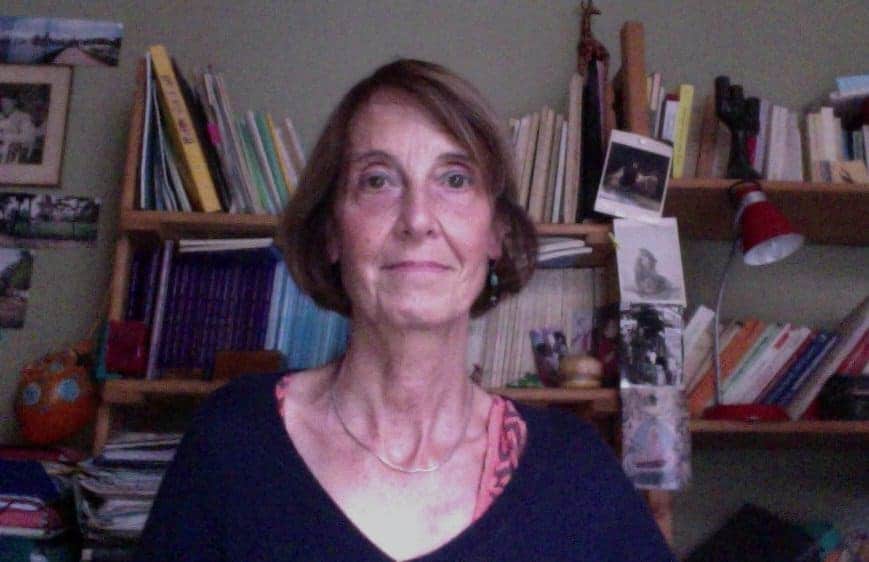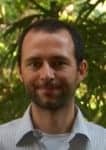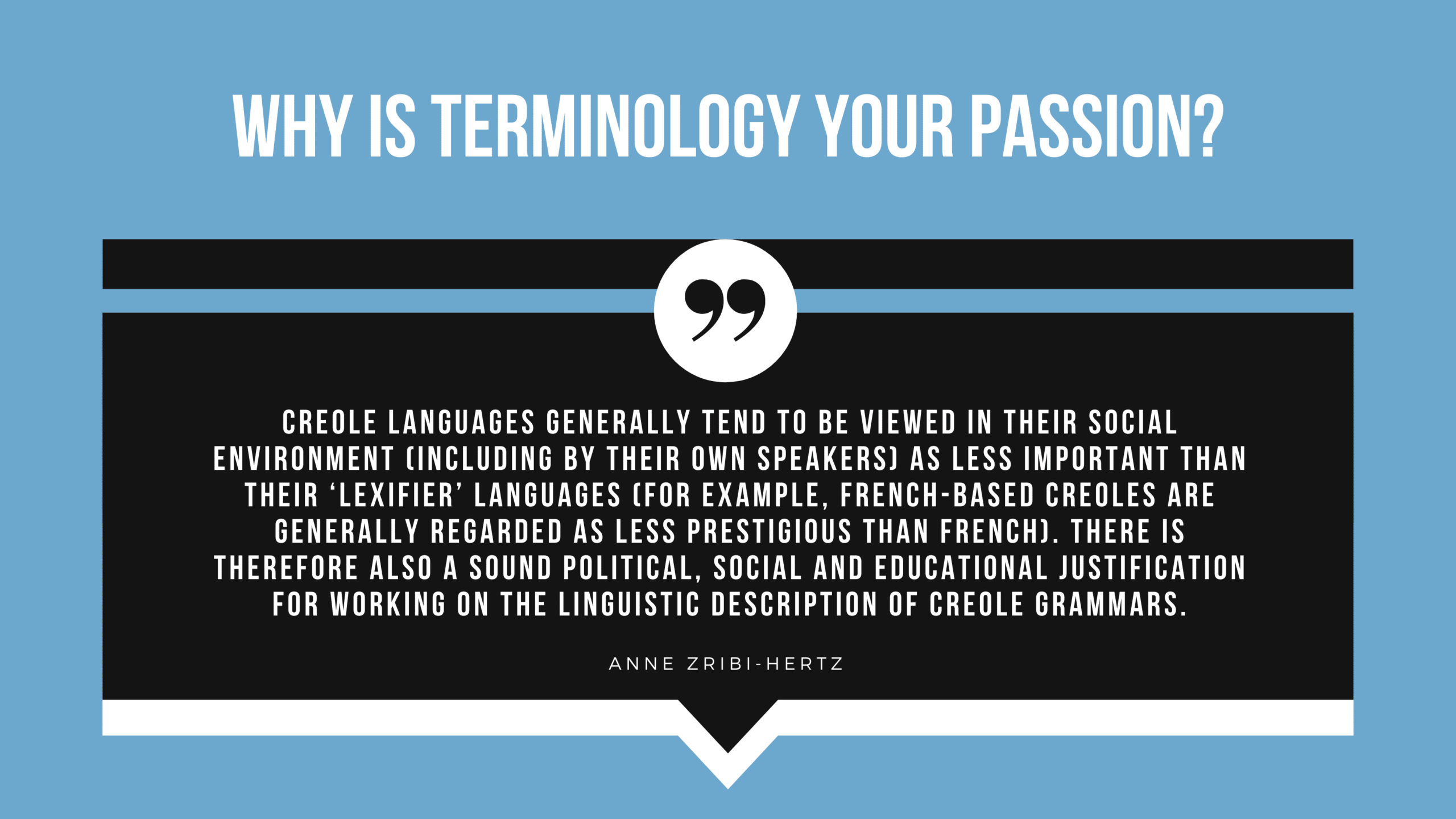 Anne Zribi-Hertz obtained a doctorate (Doctorat d’Etat) from the University of Paris 8 in 1986. She is now emeritus professor at the same university and head of the Creole Grammar Research Group (GRGC) at the CNRS/University of Paris 8 Vincennes-Saint-Denis Structures Formelles du Langage (formal language structures) Joint Research Unit (UMR 7023). The GRGC, which is made up of creole specialists from France and a number of other countries, holds monthly seminars on creole languages and their grammars. Professor Zribi-Hertz’s work focuses on descriptive, comparative and theoretical morphosyntax. She has published papers on French (both standard and non-standard) and English and on a range of typologically diverse languages including French-based creoles.
Anne Zribi-Hertz obtained a doctorate (Doctorat d’Etat) from the University of Paris 8 in 1986. She is now emeritus professor at the same university and head of the Creole Grammar Research Group (GRGC) at the CNRS/University of Paris 8 Vincennes-Saint-Denis Structures Formelles du Langage (formal language structures) Joint Research Unit (UMR 7023). The GRGC, which is made up of creole specialists from France and a number of other countries, holds monthly seminars on creole languages and their grammars. Professor Zribi-Hertz’s work focuses on descriptive, comparative and theoretical morphosyntax. She has published papers on French (both standard and non-standard) and English and on a range of typologically diverse languages including French-based creoles.
1) When and why did you decide to study creole languages?
I first started getting interested in creole languages – specifically French-based creoles – in the early 1980s, after my university (formerly known as the Centre Universitaire Expérimental de Vincennes) moved to Saint-Denis in 1981, when it started to take in large numbers of students from the northern suburbs of Paris, who included many French speakers (either monolingual or bilingual) from modest social backgrounds as well as many immigrants with native languages other than French. Realising that we (the teaching staff) had to adjust our teaching methods and courses to this new student intake, I suggested to a number of my colleagues that we should take advantage of our university’s linguistic diversity to apply the tools we had developed on the basis of our linguistic theories (whatever they might be) to the study of the languages actually spoken by our students. The range of languages open to us was fairly broad (a paradise for linguists!) and included French-based creoles, spoken mainly at the time by students from the French Antilles and Mauritius. The other languages widely spoken at Paris 8 in the early 1980s included Farsi, Azeri Turkish (from Azerbaijan) and a range of languages from French-speaking Africa (such as Lingala, Kikongo, Bambara, Wolof, Sango and Malagasy). My general approach was to study all the languages to which I could have direct access and to make use of the treasure trove offered to me to test out linguistic theories against actual data (in what would be a form of continuing training for me as a linguist) and to spark an interest in linguistics in my students (in particular in syntax, which is what I was teaching).
French-lexifier creoles interested me first and foremost in my capacity as a linguist, owing to their complex relationship with French, which raises a number of theoretical issues that are well-known to creolists and is an interesting starting point for the study of the patterns of linguistic change. They also interested me as a teacher and educator, because I had the impression that students who were bilingual in French and creole often – not always, but often – had problems mastering standard French. Assuming that these problems had to be language-based, I thought that the best way of helping these students to improve their academic performance was to train them to make a clear separation between their two ‘in-built’ grammars – French grammar and creole grammar – by examining them both objectively and on an equal footing, using the same tools. I subsequently mentored two creole-speaking students – one from Haiti, the other from Mauritius – in their studies, and they both went on to obtain a doctorate, writing their theses on the morphosyntax of their creoles, and now have teaching posts in their own countries. While working alongside them, I learned a lot about the grammar of their two creole languages and about creole grammars in general.
2) Which creole languages do you study?
The presence of creole-speaking students at Paris 8 has given me direct access to Martinican, Gaudaloupean, Haitian and Guyanese Creole, as well as to Mauritian Creole (but only once to Reunion Creole). The creoles I have studied in greatest detail (and published papers on) are Mauritian Creole (in the 1980s), Haitian Creole (since 2002) and Martinican Creole (since 2013).
3) Have you had a chance to study creole languages directly in creole-speaking communities?
I have never done any actual ‘fieldwork’ in the normal sense of the term, meaning that I have not gone out to record people in creole-speaking areas. My focus is on generative linguistics, which sees the grammar of a language as first and foremost an in- built grammar which is fundamentally ideolectal, i.e. recorded in the speaker’s brain. So, in order to explore the properties of a creole grammar, I have no need to travel because I have the opportunity, in Paris, to work with carefully chosen speakers/consultants. One could therefore say that I have been doing fieldwork for more than 30 years without ever actually going ‘out into the field’. All the speakers/consultants (student linguists) with whom I have co-authored articles have been highly motivated and have played their role as consultants with great intelligence and to great effect. The type of work I have been doing (focusing on morphosyntactical issues, which are necessarily linked to semantics) cannot be performed on the basis of recordings of the spontaneous speech of a variety of people made ‘out in the field’. Linguistic fieldwork (in the normal sense of the term) has a different output from what I do, taking the form of records of features or expressions, linguistic maps and suchlike.
I have been able to gain direct access to data on creole languages from the students with whom I have been working. The students in turn have had direct access to other speakers with whom to discuss the data, to make acceptability judgments, to check and produce other data, and so on. For example, the Martinican student with whom I am currently working lives in Paris but is constantly getting in touch with friends and family members based in Martinique, whom he bombards with questions on data. The examples we select for the papers we produce, and the interpretations and acceptability judgments we make have all been validated by more than one speaker, not because I have any doubts about the fundamentally ideolectal nature of any in-built grammar, but because this process of comparing and checking data gives our consultants the opportunity to clarify and organise their knowledge and understanding of their languages.
4) You head up the Creole Grammar Research Group. Can you say what the group’s aims are and what it does?
The Creole Grammar Research Group (GRGC) was officially set up in 2006 in my research unit (Formal Language Structures) at the National Scientific Research Centre (CNRS). Prior to the group’s establishment, various research activities relating to creole languages had been going on in the linguistics department at Paris 8 University since the 1980s (tutored projects focusing on creole grammar, study days on creole languages, etc.). So the new group, which was given a name but no budget of any kind, merely served to give a higher profile to a process that had started many years earlier. From the outset, we decided we would be a research group that: (i) focused on creole grammars (leaving aside the sociolinguistics of creole-speaking communities, the teaching of French in those communities, creole culture and literature and so on); and (ii) was ‘international’, rather than specifically French, and would work together with creolists in other countries, starting with those at the University of Amsterdam, where Enoch Aboh, Hans den Besten and Norval Smith were taking a keen interest in creole languages in general and Surinamese creoles and Afrikaans in particular. Characteristics (i) and (ii) set us apart from the Comité International d’Etudes Créoles (international committee for creole studies) set up in Aix-en-Provence by Robert Chaudenson, which had a more general (less grammar-oriented) remit, was primarily French (the project was funded by the Agence de la Francophonie) and focused on French-based creoles.
The aim of our group was simply to create a stimulating, interactive environment in Paris for linguists working on creole grammars. We hold monthly seminars, always on a Monday afternoon at the CNRS centre in rue Pouchet (which is where the Paris 8 University’s linguistics lab is based). Each seminar is organised around one or two papers, some given by Parisian members of the group (who present their current work) and others by external researchers who have something to present (and who are always welcome). The regular group is small but lively, and the discussions, which are often attended by visitors, are always friendly and non-partisan. So it’s all very positive. The GRGC has been a useful prop for a number of creole-speaking creolists working on their doctorates: the University of Paris can already boast three theses (two already completed, by Henri [Paris 7] and Alleesaib [Paris 8] on Mauritian Creole and Glaude [Paris 8] on Haitian Creole, and a third still in progress at Paris 7 [Hassamal]), while a number of other creolist doctoral students from foreign universities (Rome, Geneva, Amsterdam, and now a Czech university) have come (or intend to come) to present papers.
Alongside the GRGC, since 2011 we have been receiving funding from the CNRS for an international research group set up to provide a network for creole researchers who up to then had been working on their own at universities scattered across Europe (Coimbra, Lisbon, Berlin, London, Amsterdam, Orleans, Lyon, Paris 7 and Paris 8): <http://www.pidgins-creoles.cnrs.fr/home>. This international programme will come to an end this year, but we just learned it will be extended under the acronym PCG ‘Pidgin and Creole Grammars’. It has given our work a very welcome boost and has raised our profile.
5) What status do creole languages have in linguistics?
From the standpoint of their grammars (i.e. their phonological, morphological, syntactical and semantic features), creoles are natural languages like any other languages. To date, no one has identified a single linguistic feature that is shared by all creole languages and specific to those languages (i.e. is not found in any other languages). The principal distinguishing feature of creoles is the external factors that resulted in their emergence as languages, by which I mean the language contact which resulted in the organic acquisition of an L2 (second language) which was dominant in the social context by speakers of L1 languages that were typologically very different from the target language. These factors provided fertile ground for a process of grammatical hybridisation (for example, Indo-European language x African language(s) —> French-, Portuguese-, English- or Dutch-based creoles; Arabic x African language(s) –> Juba Arabic), which understandably fascinates a number of linguists; in this connection see Enoch Aboh’s (a member of GRGC and PCG) fascinating recent book Complex processes in new languages, published in 2015 by John Benjamins.
Because creole grammars are very obviously hybrid (all grammars are perhaps hybrid, but less obviously so), more than any other grammar they prompt the linguists studying them to delve into the linguistic changes that led to the emergence of the languages’ features, and to focus simultaneously on synchronic and diachronic patterns.
6) Why is it important to study creole languages? What contribution does the study of these languages make to linguistics?
This question is not very different from the previous one. The study of creole languages calls for a focus on both synchronic description and diachronic change. What is more, creole languages generally tend to be viewed in their social environment (including by their own speakers) as less important than their ‘lexifier’ languages (for example, French-based creoles are generally regarded as less prestigious than French). There is therefore also a sound political, social and educational justification for working on the linguistic description of creole grammars:
– political and social justification: the standardisation of creole grammars (involving the setting of rules and the adoption of an official written form) is a precondition for the official recognition of the languages, and hence their promotion and their use for administrative, educational (in school textbooks) and other purposes. This is particularly important in a country like Haiti, where only 15% of the population has a proper grasp of French;
– educational justification: creole speakers will be able to gain a better grasp of the standard lexifier language (taught in school and whose use is expected in formal situations) if they are able to neatly separate the two grammars — that of the lexifier, that of the creole — and thus to (proudly) acknowledge themselves as clearly bilingual.
7) What future do you see for creole language studies? What are the main problems that need to be resolved?
The linguistic study of creoles is dependent on scholars’ interest in these languages and on the opportunities they have to study them, which are in turn dependent on a range of both internal (scientific) and external (political) factors. Creoles are currently studied both by non-creole speakers (or at least non-native speakers) – for example, Dutch scholars studying Surinamese creoles or Afrikaans, English scholars studying English-based creoles, and French or Romance-language diachronic researchers studying French-based or Romance-language-based creoles – and by creole-speaking linguists, for example in the French Caribbean, Jamaica, Haiti, Mauritius, but also in Europe and the United States. The future of creole studies will perhaps not be the same in European and American universities as in creole-speaking countries or territories, and in the latter, in those where creole is an official language craving for standardization (e.g. Haiti) and those in which things are more complicated (e.g. Martinique, where creole coexists with national French as a ‘regional’ language). There is yet an enormous amount of scholarly research to be done on creole grammars with the tools and methods of modern science and linguistics — detailed descriptive monographs are needed for every one of them, covering all modules of grammar (phonology, morphology, syntax, semantics); computerised databases would be welcome, as well as in-depth work on the development of each grammar, following for instance the ‘hybridation’ path explored by Aboh 2015 which implies a polyvalent sort of linguistic and historical expertise. I therefore sincerely hope that research projects on creole grammars will keep being encouraged across the world by scholarly institutions.
Interviewer:
 Michal Kováč is studying for a doctorate in French philology in the Romance Language Institute at Masaryk University in Brno, Czech Republic. He completed at traineeship in the European Parliament’s Slovak Translation Unit and took part in a study visit to Parliament’s TermCoord Unit in Luxembourg. He loves France, the French language and history and has a keen interest in French- based creoles and in terminology.
Michal Kováč is studying for a doctorate in French philology in the Romance Language Institute at Masaryk University in Brno, Czech Republic. He completed at traineeship in the European Parliament’s Slovak Translation Unit and took part in a study visit to Parliament’s TermCoord Unit in Luxembourg. He loves France, the French language and history and has a keen interest in French- based creoles and in terminology.

